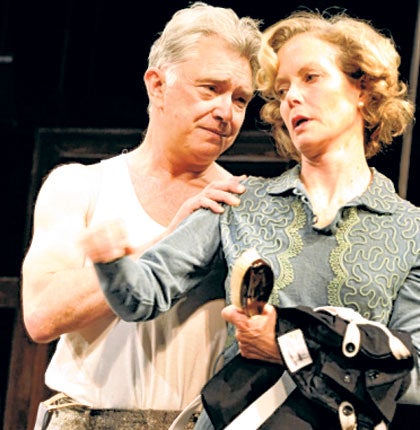The Country Girl, Apollo Theatre, London

Your support helps us to tell the story
From reproductive rights to climate change to Big Tech, The Independent is on the ground when the story is developing. Whether it's investigating the financials of Elon Musk's pro-Trump PAC or producing our latest documentary, 'The A Word', which shines a light on the American women fighting for reproductive rights, we know how important it is to parse out the facts from the messaging.
At such a critical moment in US history, we need reporters on the ground. Your donation allows us to keep sending journalists to speak to both sides of the story.
The Independent is trusted by Americans across the entire political spectrum. And unlike many other quality news outlets, we choose not to lock Americans out of our reporting and analysis with paywalls. We believe quality journalism should be available to everyone, paid for by those who can afford it.
Your support makes all the difference."I'm getting baggy under the eyes," exclaims the old actor on the comeback trail in Clifford Odets's wonderful backstage drama. But as that actor is played by baggy-eyed Martin Shaw, the remark is as superfluous as Edith Evans's complaint in Hay Fever years ago that someone was speaking to her as if she were 80 (which she more or less was).
Shaw plays Frank Elgin, a sacred monster on the skids who is losing his lines, his last chance, and possibly his wife, on the road in Boston. But Elgin hasn't lost his marbles. On a diet of alcoholic cough mixture – he's a cunning drunk; the Elgin gargles are secreted about the set in little bite-sized bottles – and rampant self-pity, he storms to triumph in New York.
Well, we assume that he does. Odets's skilful last act leaves the door open for either hollow victory or false redemption. Frank's lied about his own life, and that of his wife, Georgie, the country girl, whom Jenny Seagrove plays as a spinsterish drudge; she then blooms in a red dress as the play's director (Mark Letheren) switches his affections from Frank, or at least dilutes them with a sensual interest in Georgie.
When the play was first done in London in 1952, with Michael Redgrave and Sam Wanamaker, it was re-titled "Winter Journey" to avoid confusion with Wycherley's The Country Wife. Rufus Norris's production goes on another journey, a sentimental one (and quotes that tune), but doesn't rise to the full majesty of the play: the peak is pique, the magic is tragic.
It's hard to feel involved with the characters, or the battle for Frank's soul, until the last scenes, when Scott Pask's atmospheric backstage design is invaded by a sleek Broadway dressing room, and the offstage first night gathers momentum in excited hearsay. Norris plots this very well, and the surprise dramatic caesura is helped by an added, belated emotional urgency in the playing.
To 26 February (0844 412 4658)
Join our commenting forum
Join thought-provoking conversations, follow other Independent readers and see their replies
Comments